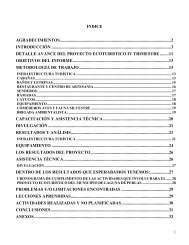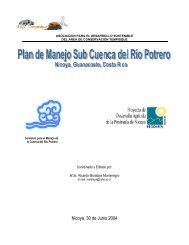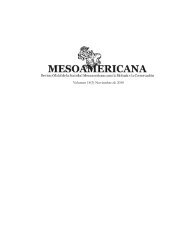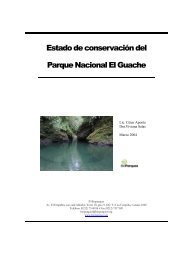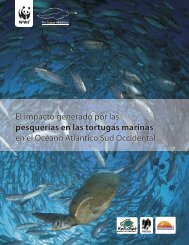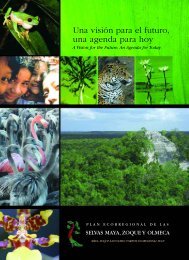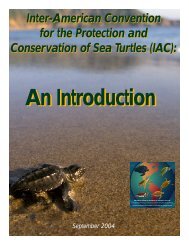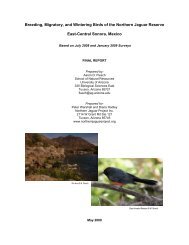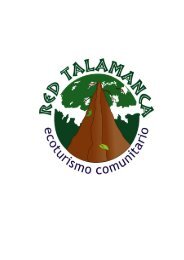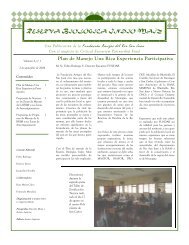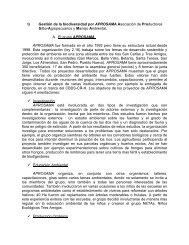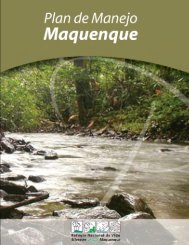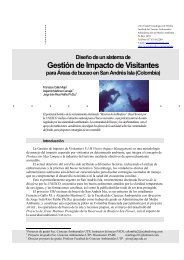21YEARS - Tourism Concern
21YEARS - Tourism Concern
21YEARS - Tourism Concern
Create successful ePaper yourself
Turn your PDF publications into a flip-book with our unique Google optimized e-Paper software.
21<br />
<strong>Tourism</strong> <strong>Concern</strong><br />
YEARS<br />
In Focus Autumn/Winter 2010<br />
www.tourismconcern.org.uk
<strong>Tourism</strong> <strong>Concern</strong> past and present<br />
Tremendous thanks are due to everyone who has helped to shape <strong>Tourism</strong><br />
<strong>Concern</strong> into what it is today, including…<br />
From back row left to right: Neville Linton, Peter Bishop, Shirley Eber, Jamie Tinklepaugh, Jim Pennington, Peter Hillel, Andrew Carton-Kelly, Liz Edwards,<br />
Angela Holland, Emma Burtles<br />
2nd row: Martin Kratz, Polly Pattullo, Tom Selwyn Junie Wadhawan, Jayne Forbes, Anne Badger, Roger Diski, Anna Borzello<br />
3rd row: Patrick Hourmant, Sue Wheat, Emma Burtles, Kelly Haynes, Maria Geiger, Francesca Leadlay, Cecilia Thom, Angela Kalisch, Simon Power, Lara Marsh<br />
4th row: Michael Lomotey, Paul Smith, Orely Minelli, Christine Franklin, Alan Nguyen, Siobhan Adeusi, Guyonne James, Margery Hancock, Gillian Cooper<br />
Front row: Lee Viesnik, John Sparrowhawk, Rachel Noble, Alison Stancliffe, Tricia Barnett, Stroma Cole<br />
Front cover photos clockwise from top left: <strong>Tourism</strong> <strong>Concern</strong> supported a local campaign against a mega-resort on the island of Bimini, Bahamas © Grant Johnson; Tricia Barnett,<br />
<strong>Tourism</strong> <strong>Concern</strong>’s director; the Kilimanjaro Porters Assistance Project, Tanzania, is using a code developed by <strong>Tourism</strong> <strong>Concern</strong> to improve working conditions for mountain<br />
porters © Karen Valenti; post-tsunami tourism development in Tamil Nadu, India, is forcing fishermen away from their beaches and families, like the young man in this<br />
photograph, cradled in his father’s hand © Sohrab Hura; child labour is one of many human rights abuses highlighted in our report, Putting <strong>Tourism</strong> to Rights © Shahab Salehi;<br />
Alison Stancliffe, founder of <strong>Tourism</strong> <strong>Concern</strong>; The Ethical Travel Guide features community-based tourism ventures from all over the world, like this one in Romania © Eco-<br />
Cultural Tour; our Destination Tsunami exhibition has been touring the UK throughout 2010 © <strong>Tourism</strong> <strong>Concern</strong>.
editorial<br />
AT 21 TOURISM CONCERN IS NOW A<br />
mature charity with a lot of learning and experience under its<br />
belt. We may be small in size, but we still earn respect around<br />
the world and punch way above our weight as we campaign<br />
for the rights of communities negatively affected by tourism.<br />
8<br />
© Nanga Parbat<br />
This special anniversary edition of <strong>Tourism</strong> In Focus reflects on the inception of<br />
this unique campaigning organisation and its many success stories. These are the<br />
culmination of the hard work of many committed individuals, but key figures<br />
have been brought together to share their first-hand experiences of some of our<br />
successful campaigns – Goa (page 6), Sun, Sand, Sea and Sweatshops (page 10),<br />
mountain porters (page 8), the Maldives (page 12) and international<br />
volunteering (page 9) are among those featured. We also present the perspectives<br />
of two tourism experts, Harold Goodwin of Leeds Metropolitan University and<br />
Caesar D’Mello of the Ecumenical Coalition on <strong>Tourism</strong>, on the extent of<br />
sustainable tourism’s progression and its future (page 14).<br />
11<br />
9<br />
© Quest<br />
With our maturity and the changing face of the charity sector, we enter a new<br />
era. Special funding for a business plan has allowed us to appoint a new director<br />
with a specific business remit and a membership officer. With their help, we will<br />
work towards financial sustainability, and broaden our portfolio of income<br />
generation so we can drive forward our unique and important work.<br />
We will continue to campaign – persuading UK travel and tourism associations<br />
to respect and protect human rights, and pushing the UK Government to take a<br />
more proactive approach to their responsibilities in countering the negative<br />
impacts of the outbound tourism sector. Our other main focus will be on<br />
tourism and water equity, research for which has already started with a case study<br />
from Bali. This will be followed by work in Kerala and, we hope, Zanzibar and<br />
Cyprus. In addition, our international volunteering code, so long in the waiting,<br />
will soon be out there to help the next generation of ‘gappers’ and volunteers<br />
choose a company that will benefit both themselves and the local community.<br />
Our resources and educational materials are going from strength to strength, with<br />
the new schools pack selling well, Putting <strong>Tourism</strong> To Rights being used by<br />
universities across the UK and the second edition of The Ethical Travel Guide<br />
(page 17) riding the wave of its success. We are also pushing forward our work to<br />
develop a professional qualification for those working in the tourism industry.<br />
<strong>Tourism</strong> <strong>Concern</strong> has a great deal to celebrate. Many challenges remain, but our<br />
energy and enthusiasm in confronting them are as great as ever.<br />
With best wishes,<br />
Stroma Cole, Chair<br />
© Raheem<br />
Contents<br />
4 Successes<br />
The road we’ve travelled<br />
6 Reflections<br />
Laying the foundations<br />
8 Campaigns<br />
Easing the burden; Mind the gap;<br />
Sun, sea, sand and sweatshops;<br />
After the storm; Paradise regained?<br />
13 Perspectives<br />
Human rights and human wrongs;<br />
Sustainable tourism: looking back…<br />
and moving forward; Our place in<br />
the world<br />
17 Resources<br />
Promoting ethical travel<br />
Editors in Chief: Tricia Barnett, Rachel Noble<br />
Designer: Andrew Carton-Kelly<br />
Proofreader: Paul Smith<br />
Editor: Cecilia Thom<br />
Picture Researcher: Richard Burton<br />
Print management: Lithosphere<br />
18 Birthday wishes<br />
Happy 21st Birthday<br />
<strong>Tourism</strong> <strong>Concern</strong><br />
The articles published in <strong>Tourism</strong> In Focus represent<br />
the individuals’ opinions and do not necessarily<br />
represent the views of <strong>Tourism</strong> <strong>Concern</strong>.
SUCCESSES<br />
The road we’ve travelled<br />
Much has been accomplished in the 21 years since <strong>Tourism</strong> <strong>Concern</strong>’s humble beginnings. Here we chart some of<br />
the people and campaigns that have shaped the organisation, and celebrate the achievements and successes<br />
1988 <strong>Tourism</strong> <strong>Concern</strong> is conceived by Alison Stancliffe, a<br />
development education worker in Newcastle, after contact with<br />
global campaigning groups that flag serious concerns about this<br />
rapidly expanding industry’s social, economic and environmental<br />
impacts (see page 6). Alison sets up a network with just six<br />
members, mainly from the education sector.<br />
1989 <strong>Tourism</strong> <strong>Concern</strong> is officially founded as a membership<br />
organisation. Seed money is received from Christian Aid, CAFOD<br />
and Interface.<br />
1990 Advocacy work begins, including a campaign to challenge<br />
tourism impacts in Goa, India; selling publications; public<br />
speaking; and lobbying key industry figures. Considerable media<br />
coverage is gained.<br />
1991 Patricia Barnett takes over as co-ordinator and <strong>Tourism</strong> <strong>Concern</strong><br />
is relocated to London.<br />
The Himalayan Trekking Code – the first multistakeholder<br />
code of its kind – is devised with UK and Nepalese<br />
trekking companies and NGOs. Used for over 15 years, it formed<br />
the basis for its successor, The Trekking Porters’ Code, which is<br />
still in use today (see page 8).<br />
1992 <strong>Tourism</strong> <strong>Concern</strong> publishes its first teaching pack for schools,<br />
Be My Guest. Hot on its heels is our first groundbreaking report,<br />
Beyond the Green Horizon: Principles of Sustainable <strong>Tourism</strong>,<br />
produced with WWF, which sets out key guidelines and<br />
principles of sustainable tourism for the first time. It was<br />
reprinted twice and translated into Spanish and French.<br />
<strong>Tourism</strong> <strong>Concern</strong>’s global network of local partners begins to<br />
grow, prompting us to campaign on their behalves on a range of<br />
tourism issues, including golf tourism, backpacking, child sex<br />
tourism and water.<br />
1995 The first major campaign is launched: Our Holidays,<br />
their Homes, focusing on people displaced by tourism,<br />
particularly tribal peoples in East Africa and the people of<br />
Burma. A public postcard campaign that challenges tour<br />
operators on their policies is met with anger, followed soon after<br />
1997<br />
by a willingness to<br />
collaborate with<br />
<strong>Tourism</strong> <strong>Concern</strong><br />
to improve industry<br />
practices.<br />
In the run-up to<br />
Visit Myanmar Year,<br />
<strong>Tourism</strong> <strong>Concern</strong><br />
joins forces with<br />
Burma Campaign<br />
UK to successfully<br />
persuade many UK<br />
tour operators to<br />
pull out of the<br />
A Mursi woman, Omo Valley, Ethiopia<br />
country because of<br />
tourism’s links with mass human rights abuses. The UK<br />
Government also calls for tour operators to withdraw.<br />
1998 <strong>Tourism</strong> <strong>Concern</strong> publishes <strong>Tourism</strong> and Human Rights to mark<br />
the 50th anniversary of the Universal Declaration of Human<br />
Rights. This paves the way for work to begin with the UK<br />
Government to improve industry practices, culminating in the<br />
creation of the Travel Foundation in 2003.<br />
1999 Looking Beyond the Brochure, a teaching video featuring tourism<br />
in The Gambia, is distributed to 5,000 teachers, schools and<br />
colleges. In-flight videos promoting ethical tourism are produced<br />
and screened on First Choice and KLM flights, as well as being<br />
available to download on ABTA's website.<br />
<strong>Tourism</strong> <strong>Concern</strong> teams up with Gambia <strong>Tourism</strong><br />
<strong>Concern</strong> to campaign against the negative impacts of all-inclusive<br />
hotels; as a result, they are banned by the Gambian Government.<br />
Plans for a proposed mega-development on Nungwi peninsular,<br />
Zanzibar, that would displace 20,000 people are scrapped<br />
following campaigning by <strong>Tourism</strong> <strong>Concern</strong>.<br />
<strong>Tourism</strong> <strong>Concern</strong> establishes The International Fair Trade in<br />
<strong>Tourism</strong> Network, which includes NGOs, tourism consultancies<br />
© Olibwe<br />
4 tourism in focus Autumn/Winter 2010
SUCCESSES<br />
and tour operators from around the world. Its foundation leads<br />
to the publication of Corporate Futures – the first-ever report on<br />
corporate social responsibility in the tourism industry.<br />
2000 <strong>Tourism</strong> <strong>Concern</strong> publishes the first listing of<br />
community tourism projects worldwide, The Community <strong>Tourism</strong><br />
Guide. Republished as The Good Alternative Travel Guide in<br />
2002, this is reincarnated again as The Ethical Travel Guide in<br />
2006 and 2009. It becomes the publisher’s best-selling title.<br />
2001 <strong>Concern</strong>ed about the impacts of the burgeoning<br />
gap-year industry, <strong>Tourism</strong> <strong>Concern</strong> convenes a conference for<br />
travellers, the travel industry and the media. This culminates in<br />
the Travellers’ Code, 250,000 copies of which are distributed by<br />
gap-year companies, plus the production of our award-winning<br />
film, Your Place or Mine, to raise awareness of the issues.<br />
2002 The Trekking Wrongs: Porters’ Rights campaign is<br />
launched. Following collaboration with porters’ groups in the<br />
Himalayas, Kilimanjaro and Macchu Picchu, as well as UK<br />
trekking operators, The Trekking Porters’ Code is launched and<br />
adopted by over half of UK operators (see page 8).<br />
The Talking Travel speaker programme kicks off. Over 70<br />
volunteers are trained as speakers and visit schools, travel<br />
shows and exhibitions across the UK.<br />
Our glossy one-off women’s ethical travel magazine, Being There,<br />
is distributed in The Body Shop across the UK to great acclaim.<br />
2003 Collaboration with London Metropolitan University<br />
to integrate sustainability into the tourism-related undergraduate<br />
curriculum leads to the publication of guidelines for universities.<br />
Our Foreign Office Advisories campaign on the<br />
damaging impacts of unnecessarily prolonged FCO advice<br />
against UK tourists visiting certain destinations culminates in the<br />
formation of a permanent multi-stakeholder panel to review<br />
advisories regularly.<br />
2004 Our Sun, Sand, Sea and Sweatshops campaign<br />
entails groundbreaking research into labour conditions in the<br />
tourism industry. Following a successful postcard campaign,<br />
the UK’s leading tour operators adopt policies on labour<br />
conditions for hotels they use (see page 10).<br />
2005 After the December 2004 Asian tsunami, <strong>Tourism</strong> <strong>Concern</strong><br />
researches the land-grabs and mass displacements of coastal<br />
communities to make way for tourism. This work underpins a<br />
new two-year programme with local partners in Sri Lanka and<br />
India to empower coastal communities to defend their land and<br />
livelihood rights against tourism-government land-grabbers.<br />
Our Behind the Smile exhibition goes on show at the Oxo Gallery<br />
in London and travels the world.<br />
2006 The first meeting of <strong>Tourism</strong> <strong>Concern</strong>’s Ethical Tour Operators’<br />
Group establishes the viability of collaborating with tour<br />
operators to promote best practice.<br />
Campaigning begins with Friends of Maldives to draw attention to<br />
that country’s state-perpetuated human rights abuses.<br />
2007 <strong>Tourism</strong> <strong>Concern</strong> is invited to key UN meetings on<br />
tourism as an advocate of grassroots issues. Ongoing dialogues<br />
with the UN Environment Programme result in partnerships with<br />
both the Global Sustainability <strong>Tourism</strong> Council and the Global<br />
<strong>Tourism</strong> Partnership, which ensure that human rights issues<br />
are addressed.<br />
2008 A pilot project to promote understanding of the<br />
social and economic impacts of tourism among communitybased<br />
enterprises in Mexico is pioneered by <strong>Tourism</strong> <strong>Concern</strong>.<br />
The results are developed into a training manual for local NGOs.<br />
2009 New research by <strong>Tourism</strong> <strong>Concern</strong> uncovers the<br />
links between luxurious resorts in Burma and members of its<br />
military regime. Renewed campaigning helps push the UK<br />
Government to update legislation, making it an offence to do<br />
business with members of the Burmese junta.<br />
After years of campaigning against a mega-resort development<br />
on the tiny island of Bimini in the Bahamas, the Bahamian<br />
Government announces plans to establish a marine-protected<br />
area. This should halt construction of the planned golf course.<br />
<strong>Tourism</strong> <strong>Concern</strong> launches Putting <strong>Tourism</strong> to<br />
Rights at the House of Lords. The report contains<br />
recommendations for governments and the international<br />
tourism industry, and lays the foundations for another 20 years<br />
of campaigning. The UN World <strong>Tourism</strong> Organisation and ABTA<br />
agree too work with <strong>Tourism</strong> <strong>Concern</strong> on the recommendations.<br />
2010 Our photography exhibition, Destination Tsunami: Stories<br />
and Struggles from India’s Southern Coast, begins its UK<br />
tour. Work on empowering coastal communities in southern<br />
India to withstand the pressures of top-down tourism<br />
development continues.<br />
www.tourismconcern.org.uk 5
REFLECTIONS<br />
Laying the foundations<br />
<strong>Tourism</strong> <strong>Concern</strong> founder Alison Stancliffe and director Tricia Barnett reflect on the establishment of the<br />
organisation and its role in changing the face of tourism for consumers, employees and people in destinations alike<br />
IN THE AUTUMN OF 1989 I SENT OUT MY FIRST NEWSLETTER TO POTENTIAL<br />
members of a brand new organisation. I called it <strong>Tourism</strong> <strong>Concern</strong><br />
because I wanted it to reflect the mindset of those it aimed to bring<br />
together – people who were concerned about the harmful impact that<br />
tourism was having on communities and environments. But I didn’t<br />
just want to get people talking – I wanted action. I was determined to<br />
do something about the injustice I’d seen on my own travels and,<br />
fortunately, the first members of <strong>Tourism</strong> <strong>Concern</strong> turned out to be just<br />
as passionate as I was to make tourism fairer for everyone.<br />
At the time I started the new network, I was at home full time with<br />
two small children. My previous work in global education had brought<br />
me in touch with groups in Europe and the Asia-Pacific region who<br />
were already raising serious questions about tourism’s social and<br />
environmental impacts. Until then, there was no equivalent in the UK<br />
but, by the end of 1989, the fledgling network had successfully<br />
evolved into an organisation strong enough to take its place in the<br />
global movement and ready to make waves within the travel industry.<br />
The most talked-about ‘winter-sun’ destination in the holiday<br />
brochures that autumn was the Indian coastal state of Goa. Locals<br />
were well used to laid-back travellers on the hippy trail who stayed<br />
for weeks or months in village homestays, but the holidaymakers<br />
<strong>Tourism</strong> <strong>Concern</strong>’s early days on the campaigning circuit<br />
Alison Stancliffe in <strong>Tourism</strong> <strong>Concern</strong>’s first office<br />
stepping off the new charter flights were a completely different<br />
breed. With these tourists came demands for sea views and imported<br />
food, as well as a whole new level of infrastructure, putting pressure<br />
on local land and water resources and threatening to deprive coastal<br />
communities of their traditional livelihoods.<br />
Goan community activists began campaigning against ‘charter<br />
tourism’ and asked us to raise their concerns with UK-based travel<br />
companies. We did just that, to the bemusement of the tour operators<br />
and press alike, both of whom were unused to the novel idea that the<br />
host community, as well as their clients, had needs. That was our first<br />
serious engagement with the travel industry and our first taste of how<br />
hard our road would be. Goa’s new resorts continued to grow with<br />
little heed taken of their impact, though we now know our solidarity<br />
contributed to fending off the worst excesses of tourism development.<br />
© <strong>Tourism</strong> <strong>Concern</strong><br />
In those heady first months, it often felt as though I were climbing a<br />
high mountain on an untried route. But I knew where I wanted to get to.<br />
This is what I wrote in that first newsletter: ‘I want quality of experience<br />
for those on holiday and quality of life for the host community.’<br />
© <strong>Tourism</strong> <strong>Concern</strong><br />
Twenty-one years on, I am incredibly proud to look back at how<br />
<strong>Tourism</strong> <strong>Concern</strong> has ceaselessly fought for the people living in the<br />
places where we take our holidays. We have never lost hold of that<br />
original ambition, but we are now much closer to achieving it.<br />
6 tourism in focus Autumn/Winter 2010
REFLECTIONS<br />
© <strong>Tourism</strong> <strong>Concern</strong><br />
WHEN I TOOK OVER AS CO-ORDINATOR OF TOURISM<br />
<strong>Concern</strong> in 1991, I had no idea I would still<br />
be here nearly 20 years later. I’ve known for<br />
years that it is far too long to stay in any job<br />
but because the job still isn’t finished,<br />
because I am still learning so much and<br />
because of the fantastic privileges it brings<br />
me when I am invited by grassroots activists<br />
to their events all over the world – I'm still<br />
here! Running <strong>Tourism</strong> <strong>Concern</strong> has been a<br />
tremendous learning experience. We are all<br />
finding our way in totally uncharted waters.<br />
Our net has been spread far and wide since<br />
working with the strong and challenging<br />
groups in Goa. We are perceived by many as<br />
the leading campaigning organisation in the<br />
world and our website attracts nearly a<br />
quarter of a million hits a year from<br />
individuals in 184 different countries. People<br />
are still shocked when they know how few<br />
we are here at <strong>Tourism</strong> <strong>Concern</strong> and how,<br />
without our stalwart volunteers, it would<br />
sometimes be difficult to manage the load.<br />
Our first campaigns were very much linked to<br />
requests for help across the world. However,<br />
as it became apparent that there were<br />
common issues for many coastal people, for<br />
fragile islands, for farmers and for people<br />
working in hotels, we made the decision to<br />
initiate our own campaigns that would look<br />
more widely at common themes such as<br />
labour conditions, displacement from land<br />
and livelihoods, and issues of water equity.<br />
All of our work is directed towards tourism<br />
as a development issue. When Alison<br />
began, we used education as a means to<br />
share our knowledge and raise awareness<br />
about development issues through tourism.<br />
<strong>Tourism</strong> presents a fantastic opportunity to<br />
understand the relationship between north<br />
and south, east and west and also about<br />
citizenship. Teachers in schools and<br />
universities formed the backbone of our<br />
membership. Looking Beyond the Brochure,<br />
our video and teachers’ pack, was<br />
requested by three-quarters of the schools<br />
Tricia working with partners in India on <strong>Tourism</strong> <strong>Concern</strong>’s post-tsunami and displacement campaign<br />
Tricia Barnett receives an award for her work<br />
in the UK and has proved to be one of our<br />
greatest successes. But, to bring about<br />
change, it was important to tackle the<br />
tourism industry itself. Our first publication,<br />
Beyond The Green Horizon, opened up the<br />
debate about sustainable tourism and was<br />
written to ensure that it was readable by<br />
those who might least want to read it.<br />
It’s taken us a long time, but we do feel<br />
that we are on the road to change. We are<br />
optimistic that by sticking to our ethical<br />
guns and by being constant, and by<br />
supporting the voices of destination<br />
communities who would otherwise not be<br />
heard, we can create paradigm shifts. It<br />
is important that we also work towards<br />
solutions and we are doing that with the<br />
industry itself. The tourism business is<br />
massive; we are tiny. But we are brave<br />
and determined.<br />
© responsible travel.com<br />
www.tourismconcern.org.uk 7
CAMPAIGNS<br />
Easing the burden<br />
Porters have long been key but somewhat<br />
invisible members of the tourism industry.<br />
Mountaineer Doug Scott looks at the<br />
movement that aimed to improve their<br />
working conditions and ensure their work<br />
would not be the death of them<br />
© Manuel Ferrigato Photography<br />
© Nanga Parbat<br />
<strong>Tourism</strong> <strong>Concern</strong>’s Trekking Porters’ Code has helped ensure<br />
better working conditions for porters all over the world<br />
IN MOST DEVELOPING COUNTRIES, THOSE THAT WORK THE HARDEST ARE OFTEN<br />
the least rewarded. Never was this truer than for Nepal’s porters 10<br />
years ago – there were hardly any rules or regulations governing<br />
tourism's labour conditions and certainly no-one to police them. Porters<br />
were paid rock-bottom wages to work in all weathers across wild<br />
terrain, often clad in just cotton and flip-flops and, after a hard day’s<br />
carry, still had to find their own shelter and food.<br />
There were occasions when lowland porters or those from the middle<br />
hills – just as susceptible to the effects of altitude as westerners –<br />
would succumb to acute mountain sickness. Of no further use to the<br />
trek, they would be paid off and dismissed. Some were too debilitated<br />
to organise their return journey and, not knowing how important it was<br />
to descend, would linger too long in the thin, cold air, develop either<br />
cerebral or pulmonary oedema (fluid retention), pass out and die.<br />
During the big Himalayan storm of October 1997, many western<br />
trekkers perished in Nepal and Bhutan. But many more porters died<br />
– some only discovered days or even weeks later when the snow<br />
melted to reveal them face down on high passes, heavy loads on<br />
their backs, invariably ill-shod and poorly clothed.<br />
Such incidents prompted <strong>Tourism</strong> <strong>Concern</strong> to tackle porter<br />
exploitation. It called upon its own expertise, as well as that of<br />
travellers, workers in the trekking industry and mountaineers, all of<br />
whom had been intending to improve the porters’ lot. <strong>Tourism</strong><br />
<strong>Concern</strong>, becoming the focus of the fear for porters’ safety and anger<br />
at their exploitation, systematically set about campaigning for change.<br />
The most effective means of attack seemed to be naming and<br />
shaming those companies that had no stringent policies to safeguard<br />
their porters and extolling the virtues of those that did.<br />
Organisations such as the International Porter Protection Group and<br />
Porter Progress have reinforced <strong>Tourism</strong> <strong>Concern</strong>’s work, while<br />
Community Action Treks Ltd (CAT) was established in 1989 primarily to<br />
improve working conditions in Nepal’s trekking industry. The only way<br />
to ensure conditions did improve and that local staff adhered to the<br />
policy was to carefully monitor the situation. A contract of employment<br />
between porters and CAT alerted the porters to their rights and<br />
reminded staff of their duties.<br />
In the last 10 years many trekking organisations and expedition<br />
organisers have adopted similar strategies for improving the lot of<br />
porters, who have enabled so many of us to enjoy the high<br />
mountains of the world. Now, largely thanks to the good work of<br />
<strong>Tourism</strong> <strong>Concern</strong>, we can revel in the sheer majesty of these<br />
surroundings with a clearer conscience.<br />
KPAP: Making a difference<br />
Based on <strong>Tourism</strong> <strong>Concern</strong>’s code of<br />
conduct for minimum working standards,<br />
the Kilimanjaro Porters Assistance Project<br />
(KPAP), a Tanzanian NGO, has produced<br />
recommended Guidelines for Proper Porter<br />
Treatment. Climbing companies adhering to<br />
the guidelines on Kilimanjaro are<br />
highlighted in the Partner for Responsible<br />
Travel programme, run by International<br />
Mountain Explorers Connection, and<br />
monitoring activities performed by KPAP<br />
ensure guideline compliance. There are 22<br />
local Partner companies and another 25<br />
local outfitters undergoing KPAP’s<br />
monitoring process. KPAP’s porter survey<br />
indicates that the average minimum wage<br />
paid to the porters is improving, up from<br />
TZS4,500 (US$3) per day in 2008 to<br />
TZS6,000 (US$4) per day in 2009. The<br />
standard is not yet at the minimum wage of<br />
TZS8,000 (US$5.34) per day but the<br />
climbing public’s desire for fair treatment<br />
practices is helping to make significant<br />
changes on Kilimanjaro. Karen Valenti<br />
“Thank you for working on our rights.<br />
I remember our company was paying a<br />
very low salary. But now, because of KPAP,<br />
we are getting a better salary.”<br />
Benny Mbukwa, porter, Tanzania<br />
8 tourism in focus Autumn/Winter 2010
Mind the gap<br />
© Simon Power<br />
Many organisations would reject the<br />
concept that international volunteering<br />
has anything to do with tourism,<br />
but there are obvious parallels and<br />
the lines between the two have<br />
become blurred. In 2007, following<br />
reports of serious problems within the volunteering<br />
industry, <strong>Tourism</strong> <strong>Concern</strong> broached the issue. Former<br />
campaigner Simon Power reports<br />
© Quest<br />
Volunteering can be a positive experience for volunteers and host communities<br />
BACK IN 2006, HAVING BEEN APPROACHED BY NUMEROUS INTERNATIONAL<br />
volunteers who were unhappy with their experiences, as well as<br />
industry professionals and experts, <strong>Tourism</strong> <strong>Concern</strong> was becoming<br />
increasingly aware of problems related to the popular practice of<br />
gap-year volunteering. Large companies were getting involved in<br />
international development projects by selling volunteer placements<br />
for profit. We heard many first-hand accounts from volunteers who<br />
felt that their placement was a waste of time. In addition – and far<br />
more seriously – we also discovered that many inexperienced<br />
volunteers were being sent to work in developing countries without<br />
having had their backgrounds checked, even though they were often<br />
working with vulnerable adults and children.<br />
We decided to run a campaign to highlight these problems and work<br />
towards developing an industry code of practice. It was clear from<br />
early on that this was going to be a challenge. Fundraising was<br />
extremely difficult – the gap-year organisations worked in so many<br />
different areas of development it was hard to explain to funders who<br />
would benefit. We also experienced resistance to the project: I<br />
remember calling one funder, who became irate on the phone,<br />
denying there was a problem and disagreeing that volunteers<br />
working with children in Africa needed a Criminal Records Bureau<br />
check, as they would in the UK.<br />
As the project gathered momentum, so did the resistance. Gap-year<br />
companies and trade associations did not want a code of practice<br />
that might restrict their money-making activities. A particularly heated<br />
debate with one industry member at a gap-year exhibition made us<br />
more aware than ever that there really was a problem. We became<br />
even more determined to develop a code.<br />
There was some strong support for the code, however, and we set up<br />
a steering group of relevant experts, including Kate Simpson from<br />
Ethical Volunteering and members of the Network of International<br />
Development Organisations in Scotland (NIDOS). We sent out<br />
questionnaires to all the UK gap-year organisations and used the<br />
results to develop a set of guidelines. This was a complicated (and<br />
political!) process and involved several trips to Edinburgh for<br />
meetings with the steering group. It culminated in a conference,<br />
attended by over 40 members of the volunteering industry, where we<br />
presented our findings and the new code of practice.<br />
<strong>Tourism</strong> <strong>Concern</strong> and NIDOS have now completed the code. It has<br />
proved difficult to fund its development into a fully audited tool for the<br />
international volunteering sector, but <strong>Tourism</strong> <strong>Concern</strong> continues to<br />
push forward with this. In addition, new funding has now been<br />
secured to support its nationwide launch next year.<br />
My subsequent work as a volunteer co-ordinator in Cambodia<br />
allowed me to witness first-hand how certain gap-year providers<br />
offer their volunteers virtually no support in badly planned<br />
placements; this is a real problem when working with small,<br />
grassroots NGOs, who are frequently desperate for any assistance<br />
they can get and so are vulnerable to exploitation. There can be no<br />
doubt that the successful launch and implementation of the code of<br />
practice is now as vital as ever.<br />
Gaps in Development is <strong>Tourism</strong> <strong>Concern</strong>’s 2007 report on<br />
the international volunteering sector.<br />
It is available at www.tourismconcern.org.uk<br />
www.tourismconcern.org.uk 9
CAMPAIGNS<br />
Sun, Sand, Sea and Sweatshops<br />
WHEN I JOINED TOURISM CONCERN IN THE EARLY 1990S, IT COMPRISED JUST MYSELF AND TRICIA BARNETT<br />
working in a cold and poky converted laundry room in Roehampton University. What never ceased to<br />
amaze me was that almost every day, when we went to fetch the post (email was a few years away!),<br />
we had amazing letters from people around the world who had somehow found our address and<br />
were asking for help.<br />
I remember sitting in that room reading correspondence from the Maasai in East Africa, environmentalists<br />
in Spain, indigenous people in Borneo and local islanders in Thailand. The stories were always very<br />
similar – tourism was developing in their area and, after the initial excitement about its potential,<br />
everyone was now deeply worried about the prospect of getting moved off their land by developers or<br />
the government; having their water supplies co-opted for hotels, golf courses and swimming pools; or<br />
realising that, as the tourist numbers increased, highly disturbing new ‘industries’ were being formed,<br />
such as child sex tourism.<br />
© <strong>Tourism</strong> <strong>Concern</strong><br />
The other common denominator was that no-one felt they were getting a fair wage in this new<br />
industry. People generally welcomed the chance of an alternative income for their communities but,<br />
after a while, they realised the financial benefits were going to someone else. These stories were vital<br />
in helping us to prove our points in the articles we wrote, speeches we gave, when we lobbied tour<br />
operators or spoke to the press and, slowly, we brought a critical analysis of the world’s largest<br />
services industry to the fore.<br />
© <strong>Tourism</strong> <strong>Concern</strong><br />
This <strong>Tourism</strong> <strong>Concern</strong><br />
campaign revolutionised<br />
daily life for exploited<br />
hotel workers across the<br />
world. Former campaigner<br />
Sue Wheat recalls its<br />
inception and how such<br />
important changes<br />
were achieved<br />
In 2002, we won EU funding to research labour conditions in international tourism. <strong>Tourism</strong> <strong>Concern</strong><br />
forged links with trade unions and NGOs in the Canary Islands, Kenya, Indonesia, the Dominican<br />
Republic, Mexico and on Egyptian-owned cruise ships. As with much research we had done over the<br />
years from our modest, low-tech offices, we were pioneers in the field. By now, the environmental<br />
and cultural impacts of tourism were becoming better understood by the tourism industry (even if only<br />
partially acted upon), but labour issues had rarely been discussed, let alone tackled.<br />
The results of our research were shocking. In each country the researchers found similar stories – hotel<br />
workers, such as cleaners, cooks, porters and waiters, were being worn down by long work hours,<br />
unstable temporary contracts and poor pay. One young man I interviewed in the Canary Islands talked to<br />
me for an hour about his suicidal thoughts and, overcome with emotion, lined up his anti-depressants<br />
on the table in front of him. This research formed the basis for a major public campaign: Sun, Sand, Sea<br />
and Sweatshops. Over a thousand <strong>Tourism</strong> <strong>Concern</strong> supporters took part by sending a postcard to the<br />
tourism industry demanding improvements to working conditions for employees.<br />
Our campaign resulted in the UK’s leading tour operators adopting policies on labour conditions for the<br />
hotels included in their holiday packages. From the research findings, <strong>Tourism</strong> <strong>Concern</strong> and a tour<br />
operator in Egypt devised and trialled the industry’s first ‘labour audit’. This provided a framework for tour<br />
operators to monitor and improve working conditions in their supply chains. Such a result shows that<br />
<strong>Tourism</strong> <strong>Concern</strong> is an organisation that punches above its weight, while successfully seeking innovative<br />
solutions and collaborating with the tourism industry to make industry practices fairer.<br />
<strong>Tourism</strong> <strong>Concern</strong>’s report, Labour Standards, Social Responsibility and <strong>Tourism</strong>, is available at<br />
www.tourismconcern.org.uk<br />
10 tourism in focus Autumn/Winter 2010
After the storm<br />
© <strong>Tourism</strong> <strong>Concern</strong><br />
Former programmes manager Guyonne<br />
James and Sumesh Mangalassery of<br />
Kabani look back at how <strong>Tourism</strong> <strong>Concern</strong><br />
supported local communities in India and<br />
Sri Lanka in the wake of the 2004 tsunami<br />
that obliterated homes and livelihoods<br />
© Raheem<br />
The 2004 tsunami wreaked havoc in towns like Sri Lanka’s Arugam Bay<br />
FOLLOWING THIS UNPRECEDENTED NATURAL DISASTER, TOURISM CONCERN WAS QUICK TO<br />
put together a report highlighting the growing concerns of local communities<br />
over tourism development plans for these shattered coastlines. With thousands<br />
of traumatised people still languishing in camps and the coastlines littered with<br />
the rubble of their lives, major tourism development was being considered as<br />
part of the reconstruction. Rather than supporting community tourism<br />
businesses, plans were going ahead for large-scale luxury resorts. Such<br />
developments would have permanently removed tsunami victims from their land<br />
and blocked their access to the sea, which most rely on for their livelihoods.<br />
Money so generously given by the public would be boosting international<br />
business rather than providing a lifeline for those who had lost everything.<br />
Emerging from the catastrophe, however, came a ground-breaking project.<br />
<strong>Tourism</strong> <strong>Concern</strong> collaborated with local NGOs Mcitra and Kabani in southern<br />
India, as well as Monlar and the People’s Planning Commission in Sri Lanka, to<br />
help mobilise and empower local communities so they could find out about<br />
tourism development planning and devise ways to challenge it.<br />
It was a hugely ambitious project – more so than we realised at the time – and<br />
we were all on a very steep learning curve. Sri Lanka, in particular, was not only<br />
recovering from the aftermath of the tsunami but the continuous civil war<br />
rumbled on throughout the project. This not only affected where the teams could<br />
work, but also the political climate in which they operated. We had our struggles<br />
in the early days but I am proud to have been part of it and prouder still that the<br />
project has shown its value by evolving and contininuing on to a second threeyear<br />
phase in India.<br />
Guyonne James<br />
THE 2004 TSUNAMI WAS A<br />
very different tragedy from<br />
any other that had<br />
occurred in human history<br />
and, over the past six<br />
years, post-tsunami experiences have<br />
shown that its impact is manifold.<br />
© <strong>Tourism</strong> <strong>Concern</strong><br />
In our globalised world, some people take<br />
everything as an opportunity to protect<br />
and advance their own vested interests,<br />
which are often detrimental to the<br />
interests or well-being of the poor.<br />
<strong>Tourism</strong> is no exception – the industry<br />
wants to take advantage of everything,<br />
and its practices are in stark contrast to<br />
its so-called ‘principles’.<br />
One year after the tsunami, a consultation<br />
organised by people's movements and<br />
NGOs in Tamil Nadu, India, identified many<br />
conflicts and contradictions related to<br />
post-tsunami tourism development, as<br />
well as certain threats, along the affected<br />
coast. The groups predicted another<br />
tragedy – this time a ‘tourism tsunami’.<br />
One of the organisers of this consultation,<br />
Kabani, tried to bring these issues onto<br />
the agenda of various organisations<br />
working in the affected coastal areas.<br />
Sadly, however, the priorities of these<br />
organisations were different from what we<br />
had identified as ‘people’s needs’.<br />
In this time of desperation, we found a<br />
helping hand from the UK in the shape of<br />
<strong>Tourism</strong> <strong>Concern</strong>. It offered us research,<br />
networking and advocacy support and we<br />
started our discussions about long-term<br />
North–South cooperation against<br />
malpractices in tourism. Fate did not have<br />
the courtesy to prevent most of the<br />
problems we predicted, but our work with<br />
<strong>Tourism</strong> <strong>Concern</strong> over the past few years<br />
has given Indian civil society a great space<br />
in global tourism discussions. <strong>Tourism</strong><br />
issues along the tsunami-affected coast<br />
became global and local simultaneously.<br />
Our ongoing work with <strong>Tourism</strong> <strong>Concern</strong> is<br />
an excellent opportunity to network with<br />
groups both domestically and on the<br />
international stage and provides a good<br />
deal of awareness and actions at various<br />
levels. We have been able to establish<br />
many networks through this collaboration,<br />
which have now started to take a stand<br />
against the negative impacts of tourism<br />
on communities and natural resources.<br />
Most of our work with <strong>Tourism</strong> <strong>Concern</strong><br />
has long-term impacts and will definitely<br />
yield further results in the future.<br />
Sumesh Mangalassery<br />
www.tourismconcern.org.uk 11
CAMPAIGNS<br />
© Dhivehi Observer<br />
By putting its dark history behind it, the Maldives<br />
could appeal to those ethical tourists who have<br />
previously steered clear of these idyllic islands<br />
Paradise regained?<br />
© David Hardingham<br />
Having rid itself of an<br />
authoritarian dictator and<br />
made great strides in the<br />
fight against human rights<br />
abuses committed on its soil,<br />
the Maldives now looks set<br />
to appeal to ethical tourists.<br />
David Hardingham of<br />
Friends of Maldives looks at<br />
those issues that are now on<br />
the tourist agenda and what<br />
must be done to secure a<br />
brighter future<br />
IT IS THE DREAM OF ALL ETHICAL TOURISTS THAT THEIR ACTIVITY IS NOT JUST FOR THEIR OWN BENEFIT, BUT ALSO<br />
contributes positively in some way to the country they are visiting. This is no truer than in a country<br />
like the Maldives, whose economy depends so heavily on tourism. Having recently ended a brutal<br />
30-year dictatorship, this fledgling democracy is at the dawn of a new age and the newly elected<br />
president – former Amnesty prisoner of conscience, Mohamed Nasheed – has his hands full.<br />
Certain elements of the previous regime are keen to return to power and stifle further reform, but<br />
President Nasheed must meet the high expectations of the people who voted him into power and<br />
nurse the Maldives’ tourism industry back to health after a bruising couple of years.<br />
Just what can be achieved is evident in the Maldives’ recent history. After a long struggle against<br />
dictatorship and human rights abuses, the first free and fair elections took place in late 2008 and<br />
ushered in a new era of liberal Islamic democracy. Friends of Maldives (FOM) and other international<br />
NGOs, including <strong>Tourism</strong> <strong>Concern</strong>, contributed to increasing worldwide awareness of the appalling<br />
human-rights situation in the country. This was instrumental in helping put international pressure on<br />
the regime to follow international standards of good governance and respect for human rights.<br />
During the dictatorship, opposition political figures were tortured and abused on prison islands<br />
not far from some of the world’s finest luxury resorts – all without the international community<br />
seeming to care. FOM’s 2005 Selective Resort Boycott Campaign targeted resorts owned by<br />
leading members of the regime and was intended to put them under pressure while leaving the<br />
bulk of the industry unaffected. The significance of tourism in the country's economy demanded<br />
that this pressure be applied with appropriate precision.<br />
And what lies ahead? <strong>Tourism</strong> has already played a pivotal role in bringing democracy to the<br />
country; it will also be the means by which it achieves economic recovery. A new and exciting<br />
development is that of the family-owned guesthouse. This sector of the industry deserves<br />
whatever help it can get – not least because benefits will flow directly to those most in need.<br />
The other vital issue that cannot be ignored is sustainability; the ethical tourist’s attention must<br />
turn to this as, unfortunately, much of the current tourism development does not seem sustainable<br />
in terms of its impact on either the economy or the environment. Preference, therefore, should be<br />
given to resorts that are making efforts at recycling, using alternative energy, and attending to<br />
environmental protection, particularly of the fragile coral-reef ecosystem. The government must be<br />
called to task on these issues.<br />
www.friendsofmaldives.org<br />
12 tourism in focus Autumn/Winter 2010
PERSPECTIVES<br />
Human rights and<br />
human wrongs<br />
Human rights lawyer Baroness Helena Kennedy answers some key questions from journalist Polly<br />
Pattullo that highlight the problems that have been created or exacerbated by the tourism industry<br />
PP: What would you identify as the main human rights abuses in<br />
relation to international tourism?<br />
HK: There are so many issues that it is hard to know where to<br />
begin. The central one is the exploitation of the poor for the<br />
gratification of the privileged. We are all conscious of the shocking<br />
sex trade of women and children in foreign countries, but, hidden<br />
from view, there are other forms of exploitation. Desperately low<br />
wages and around-the-clock working hours are human rights<br />
abuses that sustain some tourist spots. In some parts of the world,<br />
tourism does not even bring employment because workers are<br />
brought from elsewhere to be employed in gated tourist complexes.<br />
Then, just think of the water use in luxury hotels with spas, and the<br />
constant hot running water for showers, baths and laundry. But go<br />
for a short walk and you'll see that often the people living in nearby<br />
shanty towns have no running water or sanitation – the water for<br />
the grand hotels has been diverted away from them. Local children<br />
are barred from their own seashores, which become private<br />
fiefdoms for the hotels. Often creating resorts has involved land<br />
grabs, with the state throwing people off their land and depriving<br />
them of their agricultural or fishing livelihood. A little research can<br />
tell you a bad story about the origins of some resorts.<br />
PP: Have any of your holiday experiences made you realise the<br />
relationship between tourism and human rights abuses?<br />
HK: Often. I have travelled in parts of India and Africa where I have<br />
wondered about the age of some of the workers, who were really<br />
children. Such things should discomfort us and move us to action.<br />
PP: People in the poor South are often the victims of human rights<br />
abuses caused by exploitation by the rich North, but the connection<br />
with tourism and human rights abuses is rarely made. Why do you<br />
think this is?<br />
HK: There are large vested interests keeping human rights<br />
abuses out of public debate. Who makes real money out of this?<br />
And tourists do not want to think of the human cost of their<br />
luxury holiday, for which they have longed and saved. They like to<br />
think that they are contributing to local economies. And often they<br />
are – but they have to question what is going on behind the<br />
facades of these idyllic resorts.<br />
PP: What connections do you make between an increase in human<br />
rights abuses in tourism and globalisation?<br />
HK: International corporations often soak developing countries of<br />
the profits that come from tourism. The money does not go to the<br />
local governments – not even in tax. It used to be that the West<br />
went to the developing world to extract its natural resources; now<br />
it has even more sophisticated ways of sucking its bones dry.<br />
PP: Some leading UK tour operators send their customers to<br />
overseas resorts where working conditions are exploitative. How<br />
should the UK Government protect these workers?<br />
HK: I would like to see this on the G20 agenda. We need better<br />
regulation of our tourist industries with obligations to inquire into<br />
human-rights standards.<br />
PP: <strong>Tourism</strong> <strong>Concern</strong> is calling<br />
on the UK Government and the UK<br />
tourism industry to ensure the<br />
rights of local people in tourism<br />
destinations are protected in line<br />
with international law. How can<br />
we best work towards making<br />
this a reality?<br />
HK: Lobbying. We all have to<br />
spread the word and become<br />
active on the issue. But just<br />
creating laws is rarely the<br />
answer – what we have to<br />
do is name and shame the<br />
companies and try to hit<br />
them in their pockets.<br />
Baroness Helena Kennedy<br />
www.tourismconcern.org.uk 13<br />
© Helena Kennedy © Celia Sorhaindo
PERSPECTIVES<br />
Sustainable tourism: looking<br />
Caesar D’Mello of ECOT, Thailand, and Harold Goodwin, of Leeds Metropolitan University, offer a Southern and a Northern<br />
perspective on sustainable tourism over the last 21 years, and whether or not the concept is a viable option for the future<br />
WHEN IT COMES TO SUSTAINABLE TOURISM, SOME PROGRESS CAN BE<br />
noted: community based tourism initiatives have sprung up;<br />
the ‘pro-poor tourism’ concept has emerged, for which credit<br />
goes to Professor Harold Goodwin; research into backpacking<br />
and ethical travel has increased; and sustainability has entered<br />
tourism advertising. But, given the industry’s scale –<br />
international tourist numbers are projected to reach 1.05<br />
billion in 2010 – these developments merely skim the surface.<br />
In 1988 the UN World <strong>Tourism</strong> Organisation defined<br />
sustainable tourism as “leading to management of all resources<br />
in such a way that economic, social and aesthetic needs can be<br />
fulfilled while maintaining cultural integrity, essential<br />
ecological processes, biological diversity and life-support<br />
systems”. Bearing this definition in mind, we ask whether or<br />
not the tourism industry has imbibed the principles of<br />
sustainable tourism. Not when one considers its footprint.<br />
While allowing for exceptions, tourism cannot be sustainable<br />
in the long run if it leaves communities poorer and divided as<br />
a result of:<br />
• the diversion of resources, such as land and water, to make<br />
way for golf courses, resorts, and so on;<br />
• the displacement of people and consequent violations of<br />
human rights and loss of livelihoods;<br />
• conflict with the local community due to quarantining of<br />
land, beach, sea;<br />
• a fragile ecology and damaged wildlife;<br />
• global warming from air travel and high use of fossil fuels;<br />
• prostitution and trafficking of women and children;<br />
• ‘commodifying’ local and indigenous peoples and culture;<br />
• health hazards such as HIV/AIDS and drugs;<br />
• revenue lost through tax concessions, subsidised land, low<br />
wages, repatriated earnings;<br />
• inflating prices beyond the reach of the local population,<br />
due to limited supply.<br />
The Ecumenical Coalition on <strong>Tourism</strong> (ECOT) is not against<br />
tourism as such but, while some in the business community<br />
Caesar D’Mello is director, Ecumenical Coalition on<br />
<strong>Tourism</strong>, Chiang Mai, Thailand. ECOT was established long<br />
before <strong>Tourism</strong> <strong>Concern</strong> to be an advocacy base for<br />
grassroots people in the South, who were struggling with<br />
tourism.<br />
www.ecotonline.org<br />
may claim that NGOs are ‘out of touch with reality’, the fact<br />
remains that tourism is too big a sector, which involves too<br />
many lives, for its direction and impact to be assessed largely<br />
in the light of a pragmatic business arrangement. An urgent<br />
paradigm shift is called for if tourism is to be truly sustainable<br />
– and it is in the interests of the industry to develop a tourism<br />
that respects the community and the environment. Advocacy<br />
groups such as <strong>Tourism</strong> <strong>Concern</strong>, ECOT and others must<br />
continue to critique the tourism industry and engage it in<br />
dialogue, pointing to a better way.<br />
© ECOT<br />
14 tourism in focus Autumn/Winter 2010
PERSPECTIVES<br />
back . . . and moving forward<br />
HAS SUSTAINABLE TOURISM MADE SIGNIFICANT PROGRESS IN THE LAST<br />
21 years? The brief answer is no – but there is scope for<br />
optimism too. In a finite world, we are increasingly aware of the<br />
limits we confront in food supply, water and energy, so surely<br />
no-one can be content with the extent of the progress that’s been<br />
made in meeting the challenge presented by the oxymoron of<br />
sustainable development. This challenge is compounded by our<br />
inability to deal with pollution from plastics to greenhouse<br />
gases. We have not yet come to terms with the fact that we<br />
cannot afford to treat the oceans and the sky, the atmosphere we<br />
breathe and which determines our climate, as a dustbin.<br />
<strong>Tourism</strong> is a part of the problem as it involves some of the most<br />
conspicuous consumption but, in order to make it sustainable,<br />
change is also needed in the industries and services that are<br />
consumed by tourists and by tourism businesses.<br />
Much effort has gone into creating the myth that tourism is the<br />
world's largest industry. This was achieved by counting all the<br />
goods and services purchased by consumers; tourism is a major<br />
consumption sector. It may be on holiday or while travelling<br />
that someone first encounters LED lights or a water-saving<br />
shower. The industry has begun to address sustainable<br />
consumption and draw attention to what can be done to reduce<br />
resource consumption and waste, and benefit local communities.<br />
We have known for a long time what needs to be done – after<br />
all it was back in 1992 that <strong>Tourism</strong> <strong>Concern</strong>, together with<br />
WWF, published Beyond the Green Horizon. There have been<br />
some cul-de-sacs. Ecotourism was never the fastest-growing<br />
sector of the industry; it was, and is, merely a tiny fragment.<br />
The case for ecotourism was based on consumers being<br />
prepared to pay more and, the reality is, they are not prepared<br />
to pay very much more. There is increasing evidence in the UK<br />
that consumers expect the businesses to have addressed<br />
sustainability – economic, social and environmental – and it is<br />
becoming a core dimension of the product. Carbon offsetting<br />
was another diversion into a dead end – the point is to reduce<br />
carbon consumption, not to get people to pay more for it.<br />
Harold Goodwin is Professor of Responsible <strong>Tourism</strong><br />
Management and director of the International Centre for<br />
Responsible <strong>Tourism</strong> at Leeds Metropolitan University.<br />
www.icrtourism.org<br />
<strong>Tourism</strong> <strong>Concern</strong> played, and continues to play, an important<br />
role in raising awareness of the issues. However, the glass is<br />
more than half empty.<br />
The challenge is large; we need a concerted effort and we need to<br />
accelerate delivery. Some independent travel companies such as<br />
Explore, Tribes, Rainbow and Exodus led the way; other larger<br />
companies like Thomas Cook and TUI are working to reduce<br />
their negative impacts and increase their positive ones. Most<br />
significantly, we begin to see the transparent reporting of the<br />
results. But we need more.<br />
© Goodwin<br />
www.tourismconcern.org.uk 15
PERSPECTIVES<br />
Our place in the world<br />
© Tjolle<br />
Valere Tjolle of<br />
TravelMole and Vision on<br />
Sustainable <strong>Tourism</strong> finds<br />
out just what ABTA<br />
director, John de Vial,<br />
thinks of <strong>Tourism</strong> <strong>Concern</strong><br />
VT: What attracts you to <strong>Tourism</strong> <strong>Concern</strong>?<br />
JdV: There is a real passion there, from Tricia,<br />
Rachel and all those who are involved. Tricia<br />
and her team are very well respected by those<br />
who take the trouble to get to know them. They<br />
are not anti tourism, they are simply anti bad<br />
tourism – anti exploitation – just as we all<br />
should be.<br />
VT: How can <strong>Tourism</strong> <strong>Concern</strong> benefit the travel<br />
industry?<br />
JdV: All mature, sophisticated industries value<br />
independent voices and critical friends. These<br />
are sometimes uncomfortable but, ultimately,<br />
they are beneficial.<br />
VT: What is ABTA’s position regarding <strong>Tourism</strong><br />
<strong>Concern</strong>?<br />
JdV: We see it as a partner. <strong>Tourism</strong> <strong>Concern</strong><br />
is within the circle of key stakeholders we value.<br />
We don't always agree, but we do value and<br />
respect its views.<br />
VT: In your opinion, what are <strong>Tourism</strong> <strong>Concern</strong>'s<br />
greatest achievements?<br />
JdV: It has championed the social aspects of<br />
sustainability. <strong>Tourism</strong> <strong>Concern</strong> provides a<br />
tenacious voice for the poor who should benefit<br />
from, and not be further excluded by, tourism.<br />
In addition, the organisation has progressed<br />
these issues in partnership with others such<br />
as The Travel Foundation.<br />
VT: In worrying times, why should the industry<br />
support <strong>Tourism</strong> <strong>Concern</strong>?<br />
JdV: Because it is important to all our futures –<br />
their agenda is part of our sustainable future as<br />
an industry. Our economic purpose is, first, to<br />
benefit the places we visit (why else would they<br />
welcome us?) and then, and only then, to<br />
benefit the visitor. If there are better places to<br />
live, there are better places to visit.<br />
One of the mistakes that has been made has<br />
been to think of responsible tourism as a niche<br />
product, a premium-offer opportunity such as<br />
luxury eco-tourism. This agenda is about the<br />
whole industry and everything we do. ABTA<br />
research shows that customers do care about<br />
this and want to know what travel organisers<br />
are doing – responsibility and sustainability are<br />
'design and build' quality issues, not optional<br />
extras. Human rights are just that – rights –<br />
and, as members of the tourism industry, we<br />
should be concerned that we fulfil the role of a<br />
powerful influence for good. That is our place in<br />
the world.<br />
VT: And their biggest current challenges?<br />
JdV: Funding in a difficult climate and getting<br />
smaller and middle-size companies on<br />
board. And getting the human rights’ agenda<br />
understood in the right context that is<br />
relevant to tourism – finding the method and<br />
platform to challenge without frightening<br />
people off.<br />
John de Vial<br />
© John de Vial/ABTA<br />
16 tourism in focus Autumn/Winter 2010
RESOURCES<br />
Promoting ethical tourism<br />
© <strong>Tourism</strong> <strong>Concern</strong><br />
Former outreach worker<br />
Michael Lomotey<br />
explains the ethos behind<br />
<strong>Tourism</strong> <strong>Concern</strong>’s<br />
ground-breaking<br />
Ethical Travel Guide and<br />
its subsequent success<br />
SINCE ITS INCEPTION, TOURISM CONCERN HAD BEEN<br />
accumulating a unique wealth of knowledge<br />
and information about ethical tourism issues,<br />
especially community-based tourism (CBT).<br />
CBT aims to directly involve and benefit local<br />
communities, particularly in the global South<br />
and, in 2000, <strong>Tourism</strong> <strong>Concern</strong> published the<br />
first ever CBT compendium, The Community<br />
<strong>Tourism</strong> Guide.<br />
In 2006, we wanted to produce something<br />
even more inspiring to intrepid, ethically<br />
minded travellers, which would capture the<br />
principles of our recently launched Avoid Guilt<br />
Trips campaign. The idea behind this<br />
campaign was to encourage people to holiday<br />
in a way that was more positive for locals,<br />
such as finding out about the culture,<br />
dressing appropriately and asking permission<br />
before taking photographs. We were thrilled<br />
that our message was taken up by so many<br />
consumers and wanted to build on the<br />
campaign’s momentum – The Ethical Travel<br />
Guide (ETG) was to contain not only listings,<br />
but also thoughtful and practical tools for<br />
travelling responsibly.<br />
I was production manager, tasked with<br />
keeping the project together. Once the author<br />
and researcher were on board, the shoots of<br />
the guide budded into the dependable and<br />
trusted source of information that it is today.<br />
But it wasn’t all plain sailing. Not only did we<br />
have to secure funding for The ETG, there<br />
was also the challenge of deciding what –<br />
and who – should go into the listings. While<br />
compiling a questionnaire, which was sent<br />
to CBT initiatives far and wide, we produced<br />
a set of qualifying principles upon which<br />
the decision of whether to include an<br />
initiative would be based. This, of course,<br />
came with its own distinct problems, not<br />
least how to verify the accuracy of the<br />
information supplied.<br />
This mammoth task was handled by the<br />
researcher, Orely Minelli, but without the<br />
knowledge of <strong>Tourism</strong> <strong>Concern</strong>’s members<br />
and the unrivalled contacts from our<br />
legendary ‘little black book’, it would<br />
undoubtedly have been much harder. That<br />
little black book contains an unmatched and<br />
invaluable collection of people and<br />
organisations – grassroots tour operators,<br />
communities both affected by tourism and<br />
involved in CBT, concerned individuals and<br />
other activists – that spans the globe. The<br />
ETG mirrors some of the aura of that book<br />
and is a solution-driven advocate for CBT<br />
projects and places the world over.<br />
The ETG has been a great success – it even<br />
became Earthscan’s bestseller, leading to an<br />
even bigger, second edition being produced<br />
in 2009. Undoubtedly this success came<br />
about because CBT is an important tool that<br />
ensures each destination’s local communities<br />
get a fair share of tourism’s benefits. The<br />
old adage, and one of <strong>Tourism</strong> <strong>Concern</strong>’s<br />
earliest campaign slogans, ‘our holidays,<br />
their homes’, still rings true and consumers,<br />
it seems, are listening. As long as people<br />
go on holiday, there is a place for The Ethical<br />
Travel Guide.<br />
To purchase your copy of The Ethical<br />
Travel Guide, 2nd edition, for the special<br />
21st anniversary price of £7.50, visit<br />
www.tourismconcern.org.uk<br />
www.tourismconcern.org.uk 17
BIRTHDAY WISHES<br />
Happy 21st Birthday<br />
<strong>Tourism</strong> <strong>Concern</strong><br />
Congratulations on your wonderful work. Keep on challenging<br />
us to think about the lives we brush up against as we take<br />
our holidays. Human rights are about respect for the<br />
humanity of others. That stays true even on our days of rest.<br />
Baroness Helena Kennedy<br />
On behalf of the Ecumenical<br />
Coalition on <strong>Tourism</strong> (ECOT),<br />
I congratulate <strong>Tourism</strong> <strong>Concern</strong><br />
on its 21st anniversary.<br />
Since <strong>Tourism</strong> <strong>Concern</strong><br />
was established, we have<br />
both enjoyed a productive<br />
relationship.<br />
Caesar D’Mello, ECOT<br />
Congratulations to <strong>Tourism</strong> <strong>Concern</strong> on its 21st anniversary and on<br />
the wonderful job that it has done over the years to bring attention<br />
to the grave issues related to the ‘other side of the tourism’. Well<br />
done TC!!<br />
We are particularly appreciative of your interests in Grenada and<br />
for your support in bringing our concerns and issues to the<br />
attention of the international public.<br />
Sandra Ferguson, Citizens in Defense of Grenada’s Lands<br />
and Heritage<br />
© Sandra Ferguson<br />
Happy anniversary,<br />
<strong>Tourism</strong> <strong>Concern</strong>.<br />
Human rights abuses are<br />
often the last thing on<br />
people’s minds when they<br />
take a holiday but, as<br />
more of us are jetting<br />
off to remote long-haul<br />
destinations, your<br />
campaigning has become<br />
even more important in<br />
the 21st century.<br />
Keep up the good work.<br />
Jenny Kleeman,<br />
journalist, writer,<br />
documentary filmmaker<br />
© Jenny Kleeman<br />
In today’s world, taking the side of the victim of injustice is an<br />
option that fewer and fewer people strain to exercise. <strong>Tourism</strong><br />
<strong>Concern</strong> stands out as one of few courageous and visionary<br />
campaigners that has chosen to speak up and fight for the<br />
rights of tourism’s many anonymous victims – communities<br />
whose livelihoods have been threatened, whose cultures are<br />
denigrated, whose children and women suffer abuse, and where<br />
workers have been reduced to sheer objects.<br />
Ranjan Soloman, Alternatives-Badayl, Goa, India<br />
Congratulations on<br />
making bread out of<br />
stone for all these years!<br />
Afzal Abdool, <strong>Tourism</strong><br />
consultant and<br />
ex-director of <strong>Tourism</strong><br />
for Dominica<br />
On its 21st anniversary, we would like to commend <strong>Tourism</strong> <strong>Concern</strong> for showing to the world<br />
that more fairly traded tourism is the only way this industry can contribute to environmental<br />
conservation and community development.<br />
We salute its achievements and the positive impacts its devoted staff have had on the lives of<br />
countless communities and workers worldwide; its perseverance and commitment to sustainable<br />
tourism have been an important catalyst beyond frontiers. <strong>Tourism</strong> <strong>Concern</strong> has become an<br />
inspiration for all of us committed to sustainable tourism development.<br />
Happy anniversary!<br />
Ronald Sanabria, sustainable tourism vice-president, Rainforest Alliance<br />
18 tourism in focus Autumn/Winter 2010
We congratulate <strong>Tourism</strong><br />
<strong>Concern</strong> on its 21st<br />
anniversary. During this time it<br />
has provided an important<br />
space for under-represented<br />
voices in the tourism industry.<br />
Erika Harms, director,<br />
Global Sustainability<br />
<strong>Tourism</strong> Council<br />
Thanks for many happy<br />
memories and for the<br />
huge and valuable<br />
contribution that <strong>Tourism</strong><br />
<strong>Concern</strong> has made on<br />
behalf of all of us.<br />
Maurice and Geri, Asset,<br />
The Gambia<br />
Happy 21st anniversary to <strong>Tourism</strong> <strong>Concern</strong>.<br />
As an organisation, it has really led the way in making<br />
sure that tourism in this country is moving towards a<br />
more sustainable approach.<br />
Harriet Lamb, executive director,<br />
Fairtrade Foundation<br />
Happy 21st to <strong>Tourism</strong> <strong>Concern</strong>! Thanks for all of your<br />
help with getting the word out to the world about megadevelopment<br />
tourism that has wreaked – and continues to<br />
wreak – havoc on the mangrove and wetland habitats of<br />
the Bahamas.<br />
Gail Woon, Earthcare<br />
© Gail Woon<br />
Congratulations <strong>Tourism</strong><br />
<strong>Concern</strong> UK!!<br />
Kenya <strong>Tourism</strong> <strong>Concern</strong><br />
was launched in 1995<br />
through the help and<br />
guidance of <strong>Tourism</strong><br />
<strong>Concern</strong> UK. It not only<br />
motivated us, but has<br />
also been the role model<br />
in our fight for fair trade,<br />
responsible tourism and<br />
promoting the Kenyan<br />
environment to sustain<br />
the industry for the<br />
benefits of our exploited<br />
indigenous people and<br />
future generations. We<br />
are what we are because<br />
of <strong>Tourism</strong> <strong>Concern</strong> UK<br />
and are very grateful<br />
indeed to have been<br />
associated with it.<br />
Sam Munyi, Kenya<br />
<strong>Tourism</strong> <strong>Concern</strong><br />
I first met Tricia Barnett in the Solomon Islands in the<br />
1990s, while working with WWF. I invited her to give the<br />
keynote speech at the country’s first ecotourism<br />
conference, at which community leaders gathered to learn<br />
how small-scale village tourism could be a more<br />
sustainable option than logging or mining. She gave a<br />
dynamic and inspiring talk with examples of the pitfalls<br />
and opportunities that tourism can bring.<br />
So, even though Solomon Islanders rarely celebrate a<br />
birthday beyond the age of one, and many rural dwellers<br />
are blissfully unaware of how old they are, I’m sure the<br />
conference participants, some of whom went on to start<br />
their own village guesthouses, would like to wish <strong>Tourism</strong><br />
<strong>Concern</strong> “Hapi birthday. Twenty wan yia, hem long taem<br />
lelebet”. I doubt you need a translation but if you do:<br />
“Happy Birthday – 21 years, that’s quite a long time.”<br />
Paul Miles, travel journalist and photographer<br />
Congratulations on 21 years of<br />
holding the tourism industry to<br />
account for its impacts on local<br />
communities and destinations!<br />
Long may you continue to tell<br />
uncomfortable truths.<br />
Justin Francis,<br />
ResponsibleTravel.com<br />
© Justin Francis<br />
I got in contact with <strong>Tourism</strong><br />
<strong>Concern</strong> back in 1995, at a<br />
time when Gambian tourism<br />
was going through difficult<br />
times due to travel directives<br />
issued by the British Foreign<br />
Office advising its citizens not<br />
to travel to the country.<br />
Since then various initiatives<br />
on sustainable tourism<br />
advocacy work have been<br />
undertaken in The Gambia to<br />
help raise the awareness of<br />
tourists travelling from the UK<br />
as well as that of locals on<br />
their roles and responsibilities<br />
towards the sustainability of<br />
the destination.<br />
I take this opportunity to<br />
congratulate <strong>Tourism</strong> <strong>Concern</strong><br />
on its 21st birthday and<br />
wish the organisation well<br />
in its commitment for<br />
fairness and social justice<br />
in global tourism.<br />
Adama Bah, Gambia<br />
<strong>Tourism</strong> <strong>Concern</strong><br />
www.tourismconcern.org.uk 19
Exclusive<br />
member offer<br />
OUR 21st BIRTHDAY PRESENT TO YOU<br />
To celebrate <strong>Tourism</strong> <strong>Concern</strong>’s 21st anniversary, we are offering members<br />
a 50% discount on all our resources, including our unique Ethical Travel Guide.<br />
The Ethical Travel Guide, 2nd edition<br />
This fully revised second edition includes more than 400 places in over 70 countries, many of which won't be found<br />
in other guidebooks or on the internet. An essential resource for responsible travellers, the guide is packed with<br />
ideas for your next holiday. From trekking in Bolivia to luxury culinary breaks in Crete, there is something for every<br />
taste and budget. (Earthscan, 2009)<br />
Usual price: £14.99 Offer price £7.50<br />
The <strong>Tourism</strong> Teaching Toolkit<br />
Offer ends 31 January 2011 so place your orders now!<br />
Visit www.tourismconcern.org.uk<br />
Putting <strong>Tourism</strong> to Rights<br />
A challenge to human rights abuses in the tourism industry<br />
This hard-hitting report exposes the many violations of human rights that occur as a direct result of tourism. It<br />
marks 61 years since UN Declaration of Human Rights and 21 years of campaigning by <strong>Tourism</strong> <strong>Concern</strong>. The<br />
report calls for action to ensure that the rights of communities in destination countries are respected and<br />
protected. It challenges the UK Government and tourism industry to recognise that human rights are a<br />
fundamental element of any sustainable approach to tourism development.<br />
Uusal price: members £9.99, non-members £14.99 Offer price £7.50<br />
A great resource for teaching GCSE Geography, GCSE Travel and <strong>Tourism</strong>, BTEC and OCR Nationals, and the new<br />
Diploma in Travel & <strong>Tourism</strong>. The Toolkit covers a range of themes around sustainable tourism development,<br />
presented in a unique assortment of materials. These include a PowerPoint presentation; our ground-breaking<br />
Putting <strong>Tourism</strong> to Rights report; The Ethical Travel Guide, 2nd edition; and a film challenging students to see<br />
tourism from different perspectives. This perfect package offers a substantial saving on buying the items separately.<br />
Usual price: £39.99 Offer price £20.00<br />
<strong>Tourism</strong> Impacts and Issues<br />
<strong>Tourism</strong> <strong>Concern</strong> Resource Material for Teaching <strong>Tourism</strong> & Leisure AS/A2 and Vocational Courses<br />
This teaching resources pack contains material on numerous themes covered in vocational and AS/A2 courses,<br />
including: ecotourism; impacts and issues; and working in travel and tourism. It includes both printed text (48<br />
pages) and a CD of images and exercises. (<strong>Tourism</strong> <strong>Concern</strong>, 2007)<br />
Usual price: £9.99 Offer price £5.00<br />
www.tourismconcern.org.uk



